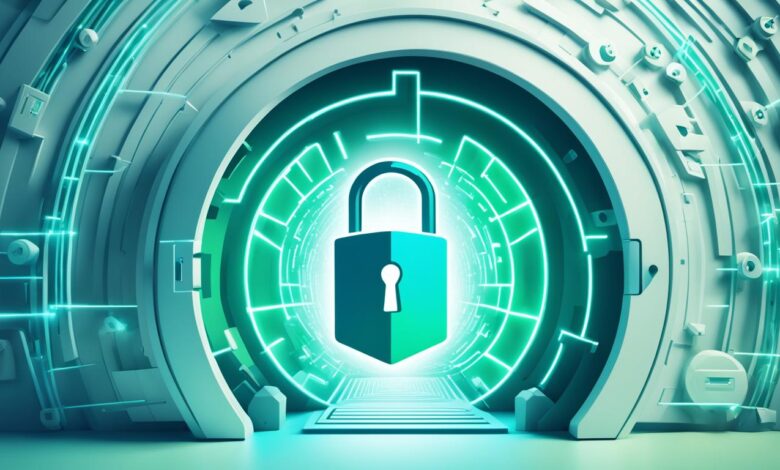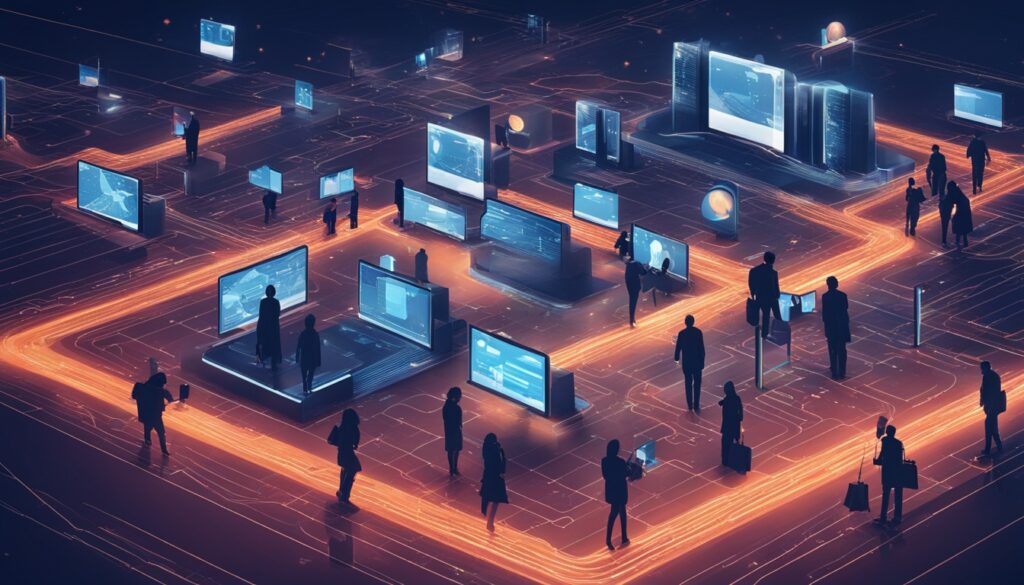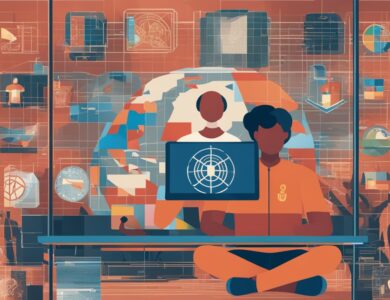
In today’s world, online data protection is top priority. Knowing how a virtual private network (VPN) works is key to keep our information safe and private. A VPN creates a secret, safe path between our device and the VPN server. This hides our real IP address, personal stuff, and where we are.
A VPN’s main job is to protect what we send over the internet. It sends our data through a VPN connection first, not from our device directly. This keeps our info safe and also hides where we are. With a VPN, we can see online stuff that might be blocked usually. It also helps us stay safer when using public Wi-Fi.
There are different types of VPNs, like PPTP, L2TP, SSTP, IKEv2, and OpenVPN. They all have their own way of keeping our data safe. For example, PPTP is good for older Windows computers1. L2TP, when used with IPsec, adds extra layers of protection to our data1. SSTP, made by Microsoft, uses SSL/TLS to make sure data travels safely1. IKEv2 works well with mobile devices and makes sure our data is encrypted with a strong 256-bit key1. OpenVPN is seen as one of the safest options. It uses SSL/TLS and special certificates for secure communication1.
Key Takeaways
- A VPN creates a safe, hidden path between our device and the VPN server.
- It hides our IP address, personal data, and location.
- VPNs keep what we send over the internet safe by using a secret route.
- They let us see online stuff that might be blocked and keep us private.
- There are many kinds of VPNs, each with its own level of safety and speed.
What is a Virtual Private Network (VPN)?
A Virtual Private Network (VPN) is a key service for today’s internet. It offers a safe way to use the internet. With a VPN, your information flows through a hidden, secure path. This keeps your private info safe and unknown to others online.
Definition of VPN
VPN tech lets you connect secretly to another network via the Internet. It turns a public network into a private one, hiding you and your data. Your IP address is hidden, and your data is locked away from those who shouldn’t see it. This keeps your internet use private and secure.
The Purpose of a VPN
VPNs are all about security and privacy, offering several key benefits:
- Internet Privacy: VPNs keep your browsing private by encrypting data and hiding your IP, so ISPs and browsers can’t track or sell your info1.
- Secure Online Browsing: They’re great for warding off cybercriminals, especially on public Wi-Fi1.
- Access to Geo-restricted Content: VPNs help you get around content bans, letting you see stuff from anywhere1.
- Internet Freedom: With a VPN, you’re safe from government spying, and you get to see all the world’s content freely1.
Because of these advantages, VPNs are crucial for staying safe and private online today.
How Does VPN Work?
A VPN changes how we think about staying safe online. It makes sure that any info sent between a user and the VPN server is safe.
The Role of VPN in Online Security
VPNs play a major part in keeping our online info safe. They encrypt data as it travels, making it safe even on risky networks. This keeps our internet connection safe from cyber-attacks and spying eyes2.
VPN Encryption and Tunneling Explained
VPN works by wrapping your data in a secure tunnel. This makes the info almost impossible to read without the right key. VPNs use strong encryption like SSTP and OpenVPN to keep data private1. IKEv2 and AES are also used for mobile security1.
VPNs also hide your real IP address from websites. They make sure sites see the VPN’s IP address instead. This adds another layer of protection, stopping ISPs from tracking you3. Knowing how VPNs work is very important for staying safe online today.
Types of VPN Protocols
Understanding VPN protocols is essential because each one offers unique benefits. These protocols make sure your VPN connection is both safe and fits your needs perfectly.
Point-to-Point Tunneling Protocol (PPTP)
The Point-to-Point Tunneling Protocol (PPTP) from Microsoft is fast but has flaws in security. This makes it not the best choice nowadays. It could be attacked, and data might not be safe45.
Layer 2 Tunneling Protocol (L2TP)
L2TP, often used with IPSec, is great for keeping your data secure. It’s very secure and is often chosen for VPNs between sites and for when you need strong encryption45.
Secure Socket Tunneling Protocol (SSTP)
SSTP, also by Microsoft, is secure through SSL and TLS. However, it doesn’t work with all systems. But it’s very reliable for those it does work with5.
Internet Key Exchange Version 2 (IKEv2)
IKEv2 is fast and great for mobile devices. It’s known for quickly reconnecting if the connection drops. This makes it perfect for people on the go with their devices5.
OpenVPN
OpenVPN is popular because it’s secure, flexible, and open source. It can use many encryption methods. That’s why it’s trusted for all kinds of VPN uses and is known to work well45. OpenVPN comes in UDP and TCP types to meet different needs for speed and protection4.
Below is a comparative table highlighting key aspects of these VPN protocols:
| VPN Protocol | Security | Speed | Use Case |
|---|---|---|---|
| PPTP | Low | High | Legacy Compatibility |
| L2TP/IPSec | High | Low | Site-to-Site VPN |
| SSTP | High | Medium | Windows-Based Platforms |
| IKEv2 | High | High | Mobile Devices |
| OpenVPN | Very High | Medium | General Use |
Advantages of Using a VPN
Using a VPN offers big benefits for our online privacy and safety. It helps keep our personal information more secure. This is key in today’s digital age.
Privacy and Anonymity
A big plus of using a VPN is keeping our online actions private. It hides what we do and our internet address. For businesses, this adds strong protection against hackers, keeping their data safe6.
Using strong encryption, like 256-bit encryption, adds another layer of defense. It stops hackers from stealing our data6. So, our browsing stays private and protected.
Accessing Geo-blocked Content
VPNs let us view content not usually available where we are. By changing our IP address, we can see what’s normally blocked. This feature is liked by more and more web users annually7.
For example, many used a VPN in 2023 to view special content. It lets you watch shows, movies, and use services you couldn’t without it.
Improved Security on Public Networks
Public Wi-Fi can be risky, but a VPN helps keep it safe. It’s known that public networks are not always secure. Yet, in 2023, over half of us used a VPN for added safety7.
Via encryption, VPNs protect our data against cyber threats. Our information is guarded, even on open networks. This keeps our private info safe from prying eyes online.
VPNs also stop ISPs from slowing our internet. By hiding our browsing, they prevent ISPs from tracking us. This keeps our internet speed fast and bypasses data limits6.
It’s especially useful for streaming and data-heavy activities. This way, you can trust your connection is always running smoothly.
- Enhanced online privacy by masking IP addresses and browsing activity7
- Protection of sensitive information with robust encryption methods6
- Access to geo-restricted content by masking the user’s IP6
- Improved security on public Wi-Fi by encrypting internet traffic7
- Avoidance of data throttling by ISPs through encrypted traffic6
In conclusion, using a VPN brings several key benefits. It’s vital for our online safety and privacy. As the online world changes, a VPN is a must-have tool to stay secure. It helps ensure a worry-free browsing experience.
Common Uses of VPNs
Virtual Private Networks (VPNs) are crucial today for many reasons. They help protect our privacy and security online. In various situations, VPNs make a big difference worldwide.
Protecting Browsing History
A key use of VPNs is keeping your browsing history safe. This helps keep ISPs and browsers from tracking what you do online. It’s especially important when sharing devices, stopping others from seeing your personal info1. VPNs make sure what you search for stays private, away from anyone who shouldn’t see it.
Securing IP Address and Location
VPNs also hide your IP address and where you are. This is essential when using public computers, where your online history could be at risk1. They do this by sending your internet use through a secure server. This way, your real IP address is hidden, keeping your location safe.
Hiding Streaming Location
Moreover, VPNs let you watch content from anywhere without revealing where you are. This feature is great for watching your home country’s shows or movies abroad. It lets people access a wide range of media by getting around local restrictions1. It also ensures you can watch what you love from anywhere.
Summary Table of Common VPN Uses
| Common VPN Uses | Details |
|---|---|
| Protecting Browsing History | Keeps online activities private from ISPs1 |
| Securing IP Address and Location | Provides online anonymity by hiding real IP address1 |
| Hiding Streaming Location | Access content from different places, better media consumption1 |
VPNs are key for keeping your online doings private, including your browsing history. They also help keep your IP address and location secret, offering anonymity online. VPNs are excellent for watching content from anywhere, making it possible to enjoy shows and movies globally.
Disadvantages of VPNs
VPNs offer many pluses but also have downsides to think about. Knowing the cons can help you pick the right VPN service.
Slower Internet Speed
VPNs might slow down your internet. They do this by sending your data through several servers and adding encryption. This makes your data travel more and needs more processing8. Some VPNs use more data for security, which could further slow down your speed, particularly if you have a data limit9. Although big VPN services try to reduce the speed problems, it’s still something to keep in mind8.

Potential Logs of User Activity
Some VPNs might keep logs of what you do online9. Free VPN services are often guilty of this and might even have harmful software. This can put you at risk9. Paid services are not immune either, so using extra protection like antivirus software is smart9.
VPN Blockades by Certain Services
VPN blockades are a problem. For example, Netflix blocks VPNs to keep to their regional content rules8. Some companies use advanced tech to spot and stop VPN use. This is common in places like online shopping where security is vital8. Getting around these blockades needs constant VPN updates and improvements.
Here is a breakdown of VPN disadvantages:
| Disadvantage | Description |
|---|---|
| Slower Internet Speed | Increased data travel time and encryption processes can reduce speeds. |
| User Activity Logs | Potential logging of data by free or even some paid VPN services. |
| VPN Blockades | Detection and prevention by services, affecting content accessibility. |
How to Choose the Right VPN Service
Choosing the best VPN is key to protecting your privacy and enjoying good performance. Look for high standards in encryption, fast speeds, and reliable connections. Also, good customer support is a must.
Criteria for Selecting a VPN
A key thing to check in a VPN is its encryption. The top encryption is AES with a 256-bit key. It’s advised by experts and big governments10. Make sure the VPN service keeps no logs to protect your privacy.
Speed is another critical factor. Since VPNs can slow down your internet, choose one that’s known for not slowing you down much10. How the VPN looks and how easy it is to use matter a lot, especially for those not great with tech. Good customer support helps fix any problems quickly, making your experience better overall.
Popular VPN Providers
Some of the best VPNs out there are NordVPN, Surfshark, and Proton VPN. They get top scores for their service. NordVPN is at 4.5, Surfshark at 4.0, and Proton VPN at a perfect 5.011. Their strong encryption, many servers, and focus on user needs make them stand out.
NordVPN, for instance, has a Kill Switch to keep you safe. It stops selected apps if the VPN drops, preventing data leaks10. ExpressVPN and CyberGhost also have many servers and put user privacy first. They are solid choices too.
With these points in mind, and by looking at the top VPNs, you can find one that meets your needs. It should be good for privacy, speed, and service quality.
The Future of VPN Technology
The future of VPN technology is full of promise. As threats to cybersecurity grow, so does the need for better and smarter VPN solutions. We’re seeing big changes in how VPNs work, especially with the use of ZTNA.
Advancements in VPN Protocols
Next Gen VPNs are setting new standards for security. Unlike older VPNs, they start by blocking access for all users. This makes them especially safe.12They use a model where users and devices only get the access they really need. This makes everything more secure.12These new protocols focus a lot on keeping data safe and making sure only the right people and devices can use them.12
Integration with Zero Trust Network Access (ZTNA)
The idea of ZTNA is getting more popular because of its strong security features. When ZTNA and Next Gen VPNs work together, it’s a powerful combo.12This approach means checking user credentials all the time. It makes sure that access is granted only when absolutely necessary.
To really make ZTNA work well, we need things like Behavioral AI, geolocation rules, and multi-factor checks. These are all part of a model called Zero Trust.12Experts say AI and automation will change the way we think about VPNs, making them more like cutting-edge WAN technology.13
In the end, new VPNs coupled with ZTNA show a big change is coming. We expect these advancements to help meet the ever-increasing challenges of cybersecurity. They will provide a strong defense for our online world.
Conclusion
In our detailed VPN guide, we’ve shown how VPNs boost online safety and keep the internet free. About 5% of web users in the USA, Great Britain, and Germany use VPNs, and more people are learning about their benefits3. The need for online safety and privacy is making VPNs more popular. People are getting serious about protecting their information and wanting free, safe online access14.
VPNs are key for both personal and business safety. By hiding online actions and making sure identities are secret, they guard against online dangers. Businesses started using VPNs more in the 2000s when they saw how unsafe the internet could be. Now, over 60% of companies use VPNs to keep their connections safe15. This shows just how important VPNs are for safe, big-scale communication.
But VPNs aren’t just about staying secure. They also let people view online content from all over the world. This means you can watch shows or visit sites that might usually be blocked in your area14. Just like how new technologies are improving, VPNs will also get better over time. Their role in keeping the internet open and protecting our online lives is only going to become more crucial. VPNs will stay a vital part of enjoying a safe and open web.
FAQ
What is a Virtual Private Network (VPN)?
How does VPN technology work?
What are the different types of VPN protocols?
What are the benefits of using a VPN?
How does a VPN improve online security?
Can a VPN slow down my internet speed?
Are there any disadvantages to using a VPN?
How do I choose the right VPN service?
What is the future of VPN technology?
Source Links
- https://www.fortinet.com/resources/cyberglossary/how-does-vpn-work
- https://medium.com/@hnasr/how-vpns-really-work-a5da843d0eb3
- https://www.kaspersky.com/resource-center/definitions/what-is-a-vpn
- https://nordlayer.com/learn/vpn/types-and-protocols/
- https://www.avast.com/c-vpn-protocols
- https://www.fortinet.com/resources/cyberglossary/benefits-of-vpn
- https://nordvpn.com/blog/benefits-of-vpn/
- https://www.cdw.com/content/cdw/en/articles/security/advantages-and-disadvantages-of-vpn.html
- https://allaboutcookies.org/vpn-disadvantages
- https://nordvpn.com/blog/how-to-choose-a-vpn/
- https://www.pcmag.com/how-to/what-is-a-vpn-and-why-you-need-one
- https://www.archonsecure.com/blog/next-gen-vpn
- https://www.techtarget.com/searchnetworking/tip/The-future-of-VPNs-in-a-post-pandemic-world
- https://cyberpanel.net/blog/what-is-a-vpn-and-how-does-it-work
- https://www.redswitches.com/blog/how-does-a-vpn-work/


